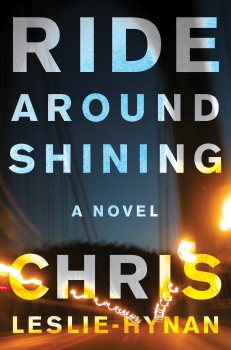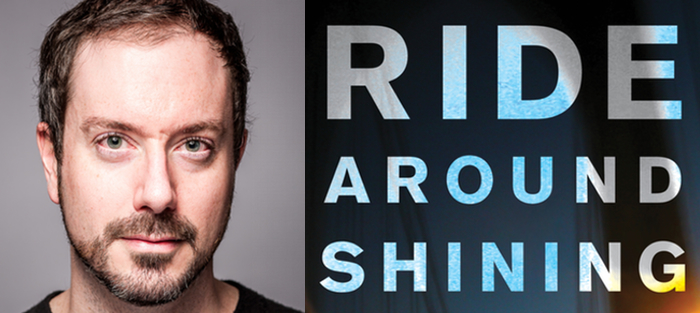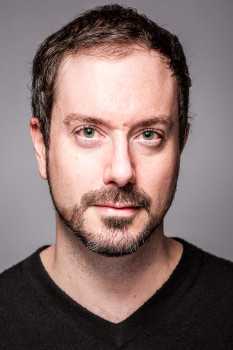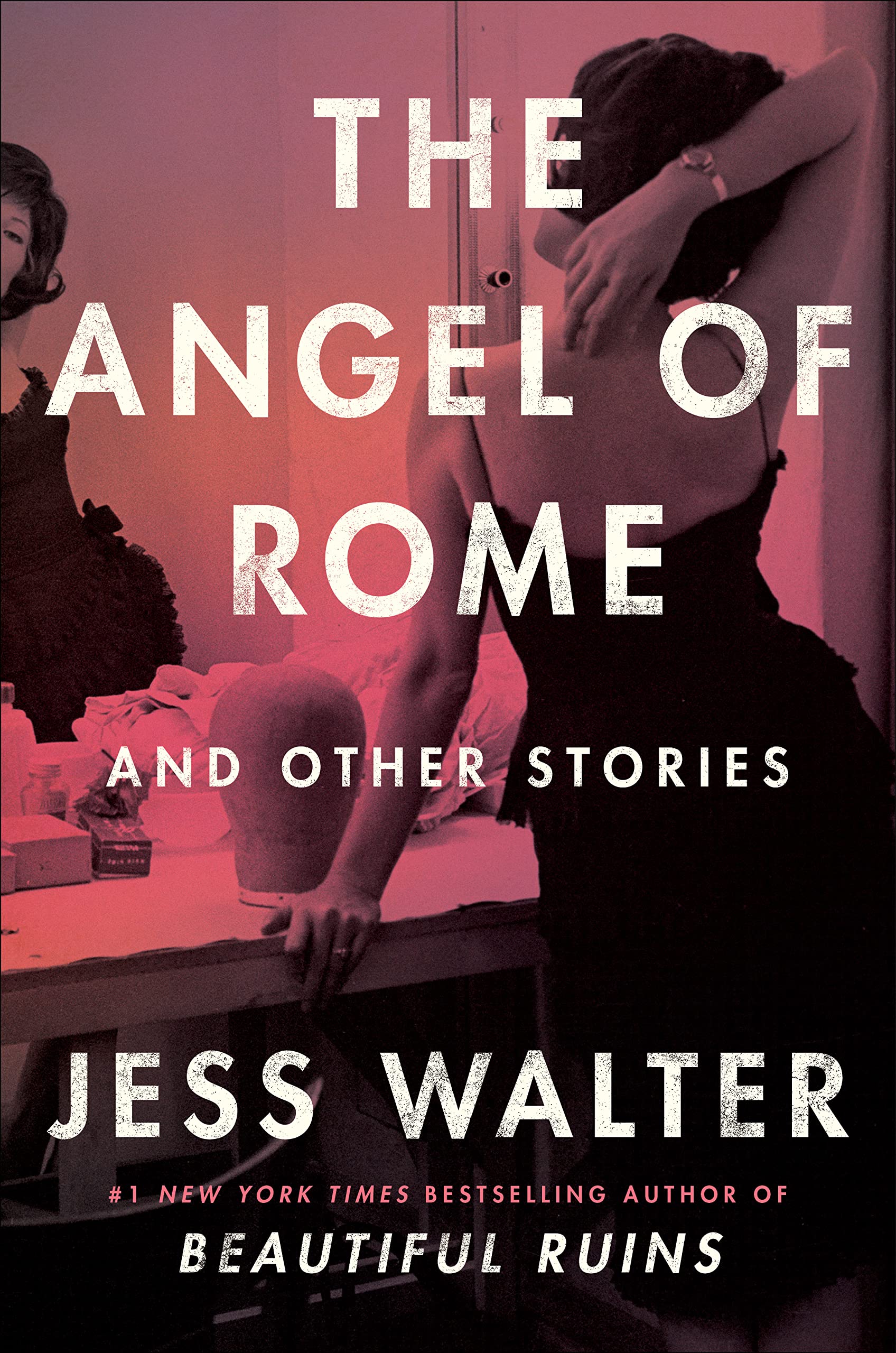When I first read Ride Around Shining (Harper) in draft form, I was captivated. It’s a book that is equally of the sharp, uneasy, media-refracted present and the dreamy nostalgia of an imagined past, and which contrives to make us feel tender about its characters even as they take us into the dark passageways of envy, class, race, and celebrity.
For me it’s impossible to describe this novel without making reference to F. Scott Fitzgerald’s work, in part because of Chris Leslie-Hynan’s prose, which dances along with the same kind of effortless-seeming effervescence, but also because of the ephemeral, perfect, self-involved and self-justifying world that both provide a glimpse into. There is a distinct parallel between Calyph, the injured NBA star in his riverside mansion, who forms the axis of this novel, and a fragile, corrupt Fitzgeraldian paradise like the young Divers in their flowered villa outside Marseille. Similarly, I expect most readers will find in Jess, the narrator of this novel, a sinister reflection of Nick Carraway. For all that, there is nothing about Ride Around Shining that feels imitative. On the contrary, it’s one of those rare books that manages to take the standard components of modern American life and rearrange them such that the familiar becomes startling, problematic, and new.
I first met Chris Leslie-Hynan at a cocktail bash for attendees of the Tin House Writer’s Workshop. I was drunk and Chris was crashing the party; we struck up a conversation in which I made the kind of wild generalization that seems important under certain alcoholic conditions and he responded with what I can only call a graceful diffidence, which suggested a worldliness beyond mine, punctuated by cutting observations. Since then, I’ve had the good fortune to call Chris a friend and to share conversations with him about the writing life, process, and craft. We met at The Waypost, a discreet bar in the North Portland neighborhood where we both live, on a summer Sunday afternoon to talk about his novel.
Interview:
Matthew Flaming: I’d like to say how much I enjoyed reading your book. Your use of language, in addition to the ways in which you engage themes of race, class, envy and aspiration are impressive to say the least. So that people reading this have some context, can you briefly summarize the plot?
 Chris Leslie-Hynan: Sure. The novel is narrated by a man named Jess, who lives in Portland, Oregon, and has two degrees and no particular ambitions. He finds his ambition in the desire to get a job working for an athlete—a fictional Portland Trail Blazer named Calyph West—and his wife, Antonia. Calyph is black and Antonia is white, as is Jess.
Chris Leslie-Hynan: Sure. The novel is narrated by a man named Jess, who lives in Portland, Oregon, and has two degrees and no particular ambitions. He finds his ambition in the desire to get a job working for an athlete—a fictional Portland Trail Blazer named Calyph West—and his wife, Antonia. Calyph is black and Antonia is white, as is Jess.
Jess isn’t quite sure at first why he’s so drawn to this job, as a chauffeur, but he lies his way into it, and he gets it. From there the reader is confronted with the puzzle of him as he begins to act more and more strangely. It gradually emerges that he has a bit of a fixation—not on Antonia, though he flirts with her—but with Calyph, and with the athletic culture that Calyph represents.
How I first described the book to friends was: imagine Othello, except instead of Othello it’s Rasheed Wallace [the former Portland Trail Blazer who later played with the Detroit Pistons when they won the NBA championship]. That would make Jess, by extension, Iago, and while he is certainly not to that level of evil he does end up doing some rather suspect, misanthropic, and voyeuristic things that propel the plot forward.
The comparison to Othello is certainly striking. Do you imagine, in some way, this book as Othello set in the glitz of the NBA?
That was the initial conception. There’s actually a [2001] teen film version of Othello called O set in a high school basketball milieu, and I joked that my book was like that as well. But then as I wrote early drafts and shared them with a few people I realized that no one ever mentioned Othello whatsoever. Perhaps I was simply delusional, or perhaps the early drafts lacked the action that the later ones eventually came around to.
Take me through the journey of writing this novel. If you were to put together a timeline of phases and major “ah-hah!” moments, what would it look like?
Well, Phase One was the semi-autobiographical novel, combined with what observations I could glean about how white men in mostly white places behaved around black men who were their peers in those places, and what observations I could glean about how that might manifest itself between a black athlete and a white fan / observer / employee. I wanted to write something about white fixation on black athletic culture, something I felt like I saw all around me but that went unaddressed, or unaddressed in the novel form.
But that novel was boring. It was too observational and too little was enacted. So Phase Two was making Jess an actor instead of an observer, and that required him to become more sinister. So I guess the “ah-hah!” moment was taking him back to his imagined roots as a bit of an Iago figure.
The final phase was realizing how much I could do with his narrative voice now that he was that unstable.
Was that a difficult choice, to make your narrator in a sense a villain?
No, no, it was a joy. But then, I don’t think of him as a villain. He often does have, as he is fond of saying, nothing but the best of intentions.
The road to hell, of course, being paved with good intentions. Jess came across to me as a fascinatingly sinister character for much of the book, perhaps because he is so selectively oblivious. One of the things I find interesting about the book is the way it at once seems very intentionally to evoke the American Gilded Age. For example, when you write:
I imagined that… young men were walking between Calyph’s outdoor court and his rose garden in bright suits as dapper and occasionally horrifying as the ones they’d worn on draft night, mingling with U of O guys up for the summer and our city’s pittance of rappers in coral-pink topcoats and ice cream shoes, while Antonia sat high above behind a shut window like an inscrutable damsel waiting to be rescued from a distress no one could name.
That reads to me like Fitzgerald or even Edith Wharton. The world of wealth, and the world of the servant class. At the same time, you’re writing about LeBron James, Kanye, Maybachs, and televised fandom.
Which makes me wonder, what’s the relationship between past and present for the characters in Ride Around Shining? What’s the significance of this duality for you, in the world of the book?
Well, most simply and selfishly, I wanted to write a book where the narrator could evoke Henry James in one paragraph and Gilbert Arenas in the next, where there’d be that kind of latitude in the voice and in the world around that it might seem natural. I couldn’t think of anything else as a prose stylist that would give me more joy than that, and that’s what I set out to do. Hopefully it worked.
But then I had a sort of sense, as an observer of white strangeness, of a feeling among white people that white people did not get to be the gilded ones anymore. This is, of course, a delusion in most cases, but there is a way in which we see LeBron and Kanye living gilded lives more publicly and arguably better than anyone else living gilded lives in the present moment. There was a line I had to cut, because it was too obscure, that Joanna Newsom wasn’t ever going to grow up and buy a piece of the Nets. Fitzgerald seemed preoccupied not only by who had money but who spent it in the most interesting fashion. Rap culture and athletic culture seem to hold that title these days, or at least more than white-guilt culture does.
Jess, your white narrator who becomes the chauffeur of this black NBA player, has a deep fascination with otherness. He says of himself, “I came from the great white middle-middles, and we could enjoy nothing but our sensible lack of gaudiness, supermarket steak, and football on the weekends. This is a terrible fate, and I think I envied something about every other class of American.”
He’s fascinated with differences of class, of race, with the glitz of the baller lifestyle. More specifically, he’s drawn to both Calyph and Antonia. For him, is that fascination simply about “interestingness” or is it something deeper?
Well, there’s that sense that white culture is not a culture at all, that whiteness is just non-ness. This a total fallacy, of course, but a prevalent one, and I think Jess feels like his history is basically a well of non-ness. So, while Antonia is white, he sees in her not just whiteness but southern-ness and affluence and this gives her a heritage and a fascination. And in Calyph he finds that which he exoticized as a middle schooler in an entirely white place turning on the television and getting notions of blackness from basketball. That’s certainly where I got my first notions of blackness.
As an “observer of white strangeness,” as you put it, where do you think that sense of other people’s experiences being somehow “more valid” comes from?
Well, it’s tempting to say that it’s a universal feeling, and one that just feels strange in white men because, well, white men, especially white men in America, have a very, very disproportionate amount of the power in the world and it’s weird to see self-nullification from such a group. White men don’t usually tend to trivialize their own experiences, which is maybe just one more suboptimal thing about us. But if you take that part out of it, it seems potentially universal to feel that one’s homeland is a place of innocence and that one must journey out into the world and attain knowledge and wisdom from the places where others live if one is going to be a valid adult. And Jess is just making that journey, in a way, albeit in a kind of fucked-up way.
There are parts of this novel that are very funny, almost farcical, but on the whole it’s a very serious book. How do you decide when and where to use humor?
I confess it isn’t always that conscious. I’m conscious of seeking a rhythm in the prose between various extremes: long sentences and short ones, dreamy observational passages and sudden action, light and dark, humor and seriousness. But of all those things, I feel least in control of where the humor goes.
I remember very vividly this moment in middle school, standing in the lunch line, telling myself, “You’re just not a funny person, so stop trying.” But then I love making people laugh, and there was another moment in college, standing I forget where, where I was like, “You’re not T.S. Eliot, stop being so horribly serious and pretentious.” Even Eliot can be hilarious in the rare moments he wants to be, but I guess I don’t consider myself august enough yet or of high enough moral purpose that I’m allowed that level of continual solemnity. I need to produce what laughter I can.
What was the hardest scene in the book for you to write? Can you describe the scene, what was difficult about it and why you felt it was important to include it?
That’s easy. There’s a scene in the middle of book where a female black employee of a different player is coerced into having sex with a man who is basically a stranger to her. This is taken to be consensual in only the flimsiest sense—it’s implied that this is occasionally part of her job description. Afterwards another man misunderstands the situation and attempts to rape her. He is rejected, forcibly. Jess comes into the aftermath of this situation and initially attempts to comfort her, but what ultimately happens is that she shows him surprising empathy and he responds by feeling an instinctual revulsion for her, because he has essentially never been around a black woman before, and leaving the room.
What was difficult about writing that doesn’t need explaining, I don’t think. But if I’m going to write a book about white strangeness toward black culture, that dichotomy—adulation of black men, terror of black women—seemed crucial to include. That exists, and what follows is as close as Jess ever gets to an awareness of a legacy of racism.
That phrase you used, that it “seemed crucial to include” this, suggests a kind of moral obligation. As a writer, do you have a sense of moral or ethical responsibility in terms of what your work should be doing?
I don’t often feel very conscious of that, honestly. I usually feel like an aesthete, just trying to write decent sentences. But with this book I was aware of being a white guy consciously setting out to write about race and about certain feelings buried in white people and I wouldn’t be much of a writer if I was going to go into all of that and come out the other side having given it a trivial treatment and being okay with that.
Was there a particular character in the novel you enjoyed writing the most?
The one character who forced his way into the book without my anticipating it was the minor character of “the bachelor.” In 2007, after one year in grad school, I came back to Portland for the summer and took a sublet up near Forest Park. It was a peculiar place, and I ended up documenting the apartment, taking pictures of it even, in order to have a record of it. After I left the guy fined me $100 for making his cat fatter and I was a bit disgruntled about this, as the cat was already obese and surely the man’s vacation in Alaska had simply made him more attuned to normal animal sizes and hence the cat merely looked fatter to him. I ended up using this man’s apartment almost wholesale as Jess’s sublet, and justifying this usury through his poor treatment of me as a sublettor. Evidently I felt guilty about this, because one morning quite unexpectedly I put the bachelor into the book and he’s this complete force of nature who runs Jess over and puts him in his place. He just sprung out full formed. I guess his power came from my retroactively realizing it was not okay to have taken all those pictures of all of his books. Sorry, bachelor, if you’re reading this.
That’s hilarious.
In addition to this novel, you’ve also written and published a number of short stories. What’s next for you?
I think I’m going to write my gambling novel next. I’ve spent a lot of my time since graduate school playing poker to make ends meet, and I need to try to turn that into some kind of valid art or else I’ll feel I’ve wasted too much time deep in the throes of degeneracy.
So is it fair to say that for you, writing is an activity that provides justification for your life? (Not to suggest that your life needs justification.)
It does, though! I remember writing an application for a post-graduate fellowship that said that what I needed to do now was to go away and write a novel to justify my existence to everyone who had ever been patient with me or believed in me or helped me to live many years without ever making much money. At this point I’m sure I have a new list of things to justify. Among the list of things I owe to Fitzgerald was his ability to look at himself and writing and say: Without this I am nothing.







